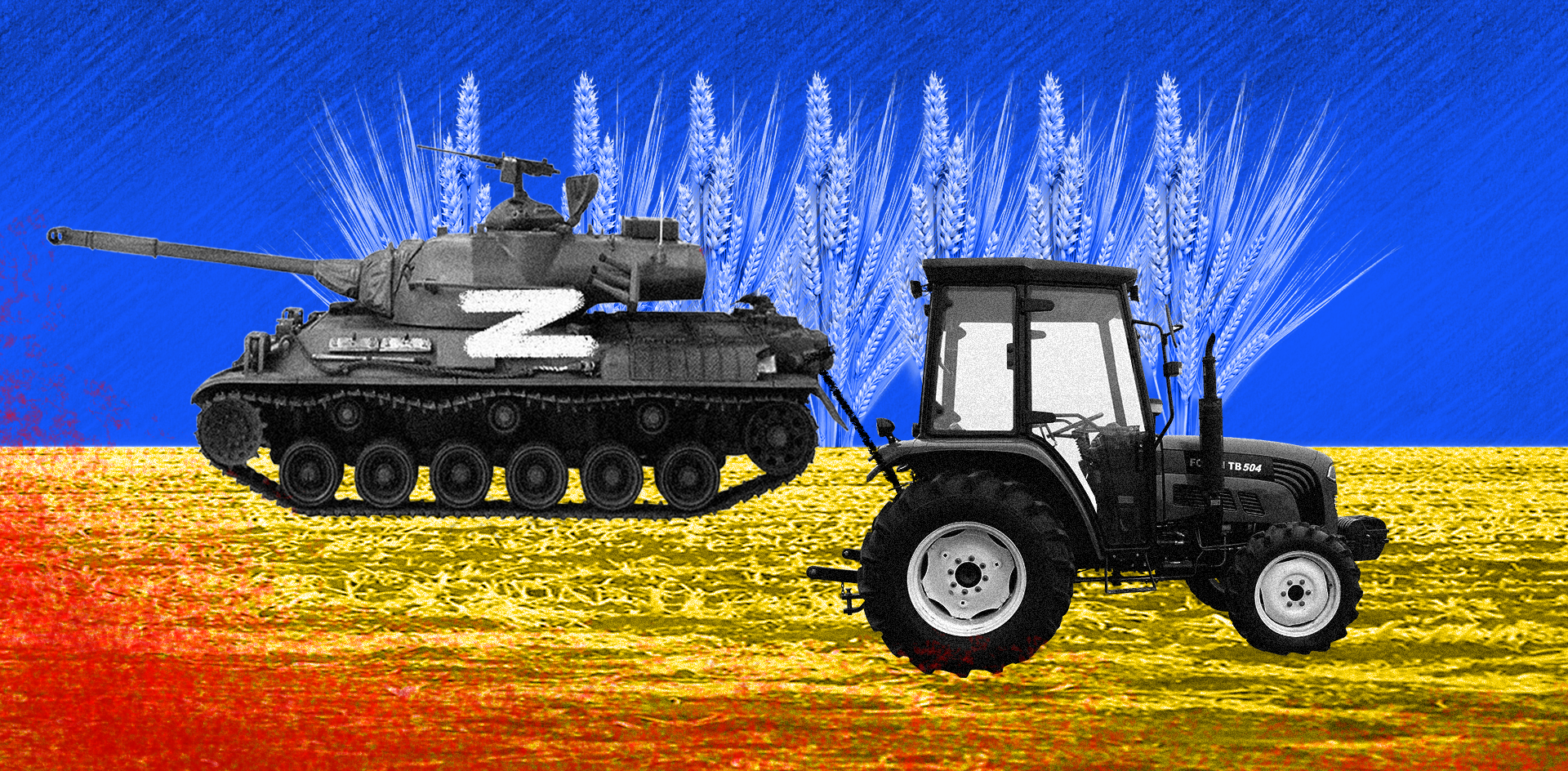Poland put an end to unlimited Ukrainian grain imports, followed by Slovakia, Hungary, and Bulgaria, as Romania also made restrictions. Kyiv is fighting while the European Commission is just watching. Analysis from Hype&Hyper.
We wrote just a week ago about how unlimited imports of Ukrainian grain are destroying farmers in Central Europe, and the tensions have not abated. The European Commission recently extended the duty-free import of Ukrainian grain until June 2024, leading Polish Agriculture Minister Henryk Kowalczyk to resign on the day Ukrainian President Volodymyr Zelensky visited Warsaw. The Ukrainian President’s first visit to Poland was not smooth, as Polish farmers continued to demonstrate to draw attention to the challenges they face due to the current unsustainable situation. The crisis is affecting not only Poles but the whole region; tractor blockades were organized in Romania and Bulgaria as well. The European Commission has made only a token gesture to the region: they proposed to give €29.5 million to Poland, €16.7 million to Bulgaria, and around €10 million to Romania as compensation, with Hungary and Slovakia left out from the package. The Commission argued that these three countries experienced the largest effect on the prices due to the Ukrainian grain import. By comparison, the European Commission estimates that farmers in Romania, Hungary, Bulgaria, Slovakia, and Poland have lost a total of €417 million due to the influx of cheap Ukrainian grain. About 10% of Ukraine’s food exports headed to Poland and 6% to Hungary. So, no wonder that all hell broke loose.
Total ban, strong reactions
On 15 April, a nice spring Saturday, the political storm arrived. „Large imports of Ukrainian grain, at lower than EU prices, are pushing down prices, threatening local agribusinesses. Thus, the government has decided on a regulation that prohibits the import of grain and many other types of food into Poland from Ukraine,” announced Jarosław Kaczyński, leader of the Law and Justice party (PiS), setting off an avalanche in Central Europe. Although Kaczyński stressed that Poland remains an ally of Ukraine, it is every state's duty to protect its citizens’ interests, in this case, Polish farmers’ concerns. Poland immediately informed Ukraine of the decision and indicated that they remained open to negotiations on the grain issue.

A few hours after the Polish announcement, on 15 April, the Hungarian government also announced the temporary ban on importing grain, oilseeds, and several other agricultural products originating in or coming from Ukraine. According to Hungary’s Minister of Agriculture, István Nagy, the current market trends would cause such severe damage to Hungarian agriculture that extraordinary measures must be taken to curb them. The Hungarian Ministry also pointed out that Ukrainian agriculture, which operates with extremely low production costs due to practices that are no longer allowed in the European Union, has exploited the full duty-free and free trade opportunities: Besides grain and oilseeds flooding the Central European market, Ukrainian poultry, eggs, and honey have also entered the region, making it impossible for local farmers to sell their products.
The primary problem is that large quantities of crops (mainly cereals, maize, and sunflowers) got stuck in Ukraine due to the Russian invasion, thus unable to reach the markets of Africa and the Middle East. As one of the world’s largest grain exporters, Ukraine has played an essential role in supplying these regions. To facilitate Kyiv’s import, the European Union set up so-called solidarity lanes, which allow cheap Ukrainian grains to flow into and fill Central and Eastern Europe’s silos. But the Ukrainian produce did not leave for the African or Middle Eastern markets; instead, they entered the European single market duty-free, thus forcing Polish, Hungarian and Romanian farmers out, who could only produce the crops at a much higher price and faced storage difficulties. So, the silos are full, the cheap Ukrainian grain has destroyed the common market, and the CEE farmers cannot sell their own produce. Everyone is angry, and we see no solution yet.
Slovakia followed the Saturday announcements on Monday, 17 April, by temporarily suspending imports of grain and some other products from Ukraine. Although Samuel Vlčan, Slovakia’s Minister of Agriculture and Rural Development, had earlier announced a ban on the processing and use of Ukrainian grain and flour in the country because of its harmful pesticide content, the total ban came only now. According to the TASR news agency, the Slovak Ministry of Agriculture has pointed out that the import of Ukrainian grain could endanger or even make impossible the situation of Slovak farmers.
On Wednesday, Bulgaria became the latest country to temporarily ban the import of Ukrainian grain, excluding goods in transit. „Over the past year, Bulgaria has seen large volumes of food remain in the country, disrupting supply chains. We are forced to adopt this national measure because the European authorities are still considering an adequate solution,” the Bulgarian government said, stressing that Bulgaria remains in solidarity with Ukraine, but the bankruptcy of Bulgarian farmers would not help Kyiv.
Tough negotiations, half-hearted agreement
The Ukrainian government sprang into action immediately after the weekend announcements, and on Monday, Ukrainian officials were already in Warsaw to start talks with the Polish government. Mykola Solsky, Ukraine’s Minister of Agriculture, said that „as a first step, Kyiv wants to see the resumption of food and grain transit through Poland.” The negotiations lasted more than a day, and although Polish media reported several times that no agreement with Kyiv would be reached, by Tuesday, the ice had been broken in Warsaw: „Poland and Ukraine have reached an agreement on the transit of Ukrainian grain,” Poland’s newly appointed Minister of Agriculture and Rural Development Robert Telus announced on Tuesday.
According to the new agreement, the transit of Ukrainian grain through Poland will restart from Friday but will be monitored and closed by the authorities. „We managed to create such mechanisms that will ensure that not a single ton of (Ukrainian) grain will remain in Poland. The goods will only pass through the country,” the Polish minister said. His Ukrainian counterpart stressed his confidence that Ukrainian export companies would respect the agreement’s provisions on grain transit.

So, while the Ukrainian government can be relieved about Poland, the ban is still in place in Hungary, Bulgaria, and Slovakia. Kyiv and Bratislava are already negotiating, and the Ukrainians also initiated discussions with the Romanians. The European Commission has also opposed the Slovak and Hungarian bans by saying that „trade policy is the EU’s exclusive competence, and thus unilateral action is unacceptable.” And this is not exclusively the Commission’s view: Zdeněk Nekula, Czech Minister of Agriculture, also believes that the Polish, Hungarian, and Slovak import bans are contrary to the operation of the EU single market and the basic regulations of the World Trade Organisation (WTO). Czech Prime Minister Petr Fiala, who is on an Asian tour, said in response to a journalist’s question that the topic is „not as intense” for Czechia as for the countries bordering Ukraine.
Although Romania has not introduced a ban, they check Ukrainian grain shipments crossing the country and conduct quality checks on food products at border crossings. Romanian Agriculture Minister Petre Daea asked the Ukrainian side to quickly find a solution to limit the export of grain and oilseeds to Romania.
Meanwhile, the European Commission has also been under pressure to act: it is reportedly preparing €100 million in aid for the farmers of the countries bordering Ukraine who have been severely affected by the increases in Ukrainian grain imports. Although this amount is considerable, it is still far below the already caused damage, not to mention the unrestricted influx of Ukrainian meat, honey, and other products.
Graphics by Pisla Réka

Design for the dignity of aging

Folk ceramics and fashion?—here comes the COAT’s spring collection










